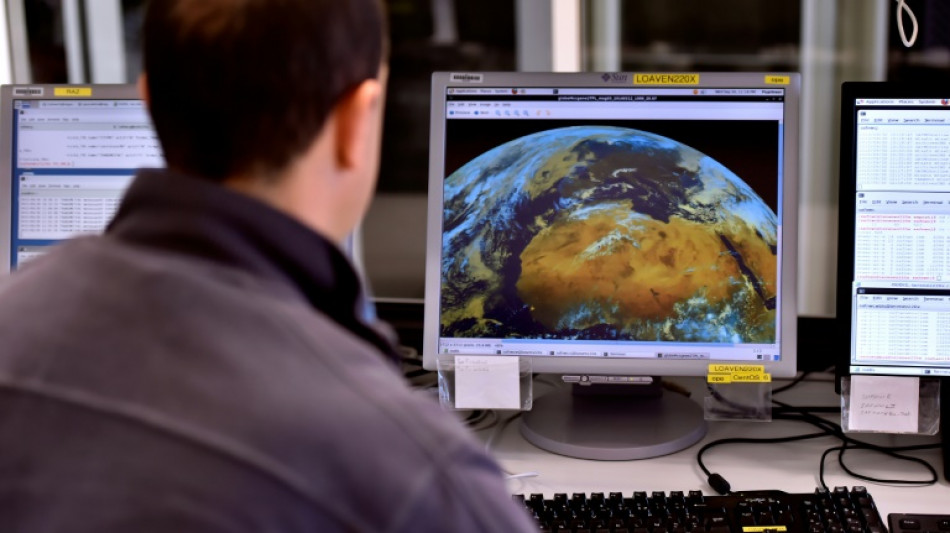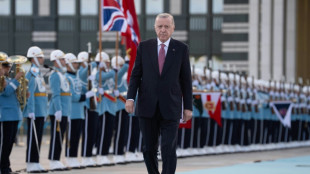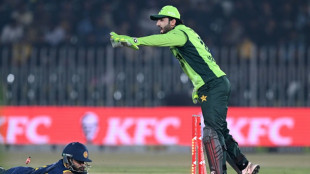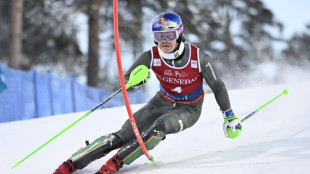
-
 Argentina beat Scotland after stunning fightback
Argentina beat Scotland after stunning fightback
-
Pope urges leaders not to leave poor behind

-
 Pressure will boost Germany in 'knockout' Slovakia clash, says Nagelsmann
Pressure will boost Germany in 'knockout' Slovakia clash, says Nagelsmann
-
Ecuador votes on hosting foreign bases as Noboa eyes more powers

-
 Portugal qualify for 2026 World Cup by thrashing Armenia
Portugal qualify for 2026 World Cup by thrashing Armenia
-
Greece to supply winter gas to war battered Ukraine

-
 India and Pakistan blind women show spirit of cricket with handshakes
India and Pakistan blind women show spirit of cricket with handshakes
-
Ukraine signs deal with Greece for winter deliveries of US gas

-
 George glad England backed-up haka response with New Zealand win
George glad England backed-up haka response with New Zealand win
-
McIlroy loses playoff but clinches seventh Race to Dubai title

-
 Ecuador votes on reforms as Noboa eyes anti-crime ramp-up
Ecuador votes on reforms as Noboa eyes anti-crime ramp-up
-
Chileans vote in elections dominated by crime, immigration

-
 Turkey seeks to host next COP as co-presidency plans falter
Turkey seeks to host next COP as co-presidency plans falter
-
Bezzecchi claims Valencia MotoGP victory in season-ender

-
 Wasim leads as Pakistan dismiss Sri Lanka for 211 in third ODI
Wasim leads as Pakistan dismiss Sri Lanka for 211 in third ODI
-
Serbia avoiding 'confiscation' of Russian shares in oil firm NIS

-
 Coach Gambhir questions 'technique and temperament' of Indian batters
Coach Gambhir questions 'technique and temperament' of Indian batters
-
Braathen wins Levi slalom for first Brazilian World Cup victory

-
 Rory McIlroy wins seventh Race to Dubai title
Rory McIlroy wins seventh Race to Dubai title
-
Samsung plans $310 bn investment to power AI expansion

-
 Harmer stars as South Africa stun India in low-scoring Test
Harmer stars as South Africa stun India in low-scoring Test
-
Mitchell ton steers New Zealand to seven-run win in first Windies ODI

-
 Harmer stars as South Africa bowl out India for 93 to win Test
Harmer stars as South Africa bowl out India for 93 to win Test
-
China authorities approve arrest of ex-abbot of Shaolin Temple

-
 Clashes erupt in Mexico City anti-crime protests, injuring 120
Clashes erupt in Mexico City anti-crime protests, injuring 120
-
India, without Gill, 10-2 at lunch chasing 124 to beat S.Africa

-
 Bavuma fifty makes India chase 124 in first Test
Bavuma fifty makes India chase 124 in first Test
-
Mitchell ton lifts New Zealand to 269-7 in first Windies ODI

-
 Ex-abbot of China's Shaolin Temple arrested for embezzlement
Ex-abbot of China's Shaolin Temple arrested for embezzlement
-
Doncic scores 41 to propel Lakers to NBA win over Bucks

-
 Colombia beats New Zealand 2-1 in friendly clash
Colombia beats New Zealand 2-1 in friendly clash
-
France's Aymoz wins Skate America men's gold as Tomono falters

-
 Gambling ads target Indonesian Meta users despite ban
Gambling ads target Indonesian Meta users despite ban
-
Joe Root: England great chases elusive century in Australia

-
 England's Archer in 'happy place', Wood 'full of energy' ahead of Ashes
England's Archer in 'happy place', Wood 'full of energy' ahead of Ashes
-
Luxury houses eye India, but barriers remain

-
 Budget coffee start-up leaves bitter taste in Berlin
Budget coffee start-up leaves bitter taste in Berlin
-
Reyna, Balogun on target for USA in 2-1 win over Paraguay

-
 Japa's Miura and Kihara capture Skate America pairs gold
Japa's Miura and Kihara capture Skate America pairs gold
-
Who can qualify for 2026 World Cup in final round of European qualifiers

-
 UK to cut protections for refugees under asylum 'overhaul'
UK to cut protections for refugees under asylum 'overhaul'
-
England's Tuchel plays down records before final World Cup qualifier

-
 Depoortere double helps France hold off spirited Fiji
Depoortere double helps France hold off spirited Fiji
-
Scotland face World Cup shootout against Denmark after Greece defeat

-
 Hansen hat-trick inspires Irish to record win over Australia
Hansen hat-trick inspires Irish to record win over Australia
-
Alcaraz secures ATP Finals showdown with 'favourite' Sinner

-
 UK to cut protections for refugees under asylum 'overhaul': govt
UK to cut protections for refugees under asylum 'overhaul': govt
-
Spain, Switzerland on World Cup brink as Belgium also made to wait

-
 Sweden's Grant leads by one at LPGA Annika tournament
Sweden's Grant leads by one at LPGA Annika tournament
-
Scotland cling to hopes of automatic World Cup qualification despite Greece defeat


Top science editor defends peer-review system in climate row
Top science journal Nature was hit with claims last week that its editors -– and those of other leading titles -– have a bias towards papers highlighting negative climate change effects. It denies the allegation.
Scientist Patrick Brown shocked his peers when he said he had tailored his study on California wildfires to emphasise global warming. He claimed it would not have been accepted if it had not pandered to editors' preferred climate "narrative".
Nature's editor-in-chief Magdalena Skipper spoke to AFP about the case and the broader challenges facing academic publishing in the age of climate change and artificial intelligence.
The interview has been edited for length and flow.
- Bias claim -
Q. Are journal editors biased towards studies that emphasise the role of climate change over other factors?
A. "The allegation that the only reason why (Patrick Brown) got the paper published in Nature was because he chose the results to fit a specific narrative makes no sense at all. I'm completely baffled (by the claim). If a researcher provides compelling, convincing, robust evidence that goes against a consensus, that study actually becomes of special interest to us -- that's how science progresses.
"Since (climate change) is a pressing issue, of course there is an awful lot of research that is funded, performed and subsequently published to probe the matter, to understand how grave the problem really is today.
"In this case we had (peer-) reviewers saying that climate change is not the only factor that affects wildfires. The author himself argued that, for the purpose of this paper, he wished to retain the focus solely on climate change.
"We were persuaded that a paper with that focus was of value to the research community because of the contribution made by the quantification (of climate impacts)."
- Studies retracted -
Q. Research shows thousands of published studies across the academic world get retracted due to irregularities. Is the peer-review system fit for purpose?
A. "I think everyone in the scientific community would agree that the peer review system isn't perfect, but it's the best system we have. No system is 100-percent perfect, which is why at Nature, we have been trialling different approaches to peer review. There can be many rounds of peer review. Its complexity depends on the comments of the reviewers. We may decide not to pursue the paper.
"We have had cases at Nature of deliberate scientific misconduct, where somebody manipulates or fabricates data. It happens across disciplines, across scientific publishing. This is extremely rare.
"I think the fact that we see retractions is actually a signal that a system works."
- Pressure to publish -
Q. Is there too much pressure on scientists to get published at any cost?
A. "Science funding is precious and scarce, let's face it. Researchers have to compete for funding. Once an investigation has been funded and carried out, it makes sense for the results to be published.
"On the other hand, PhD students in many educational systems are required to publish one or more scientific papers before they graduate. Is this a helpful requirement when we know that a large proportion of PhD students are not going to continue in research?
"In many cases, early-career researchers waste time, opportunity and money to publish in predatory journals (that, unlike Nature, take a fee without offering proper peer review and editing), where their reputation suffers. They are effectively tricked into thinking that they are genuinely publishing to share information with the community."
- AI in publishing -
Q. What measures is Nature taking to monitor the use of artificial intelligence programs in producing scientific studies?
A. "We do not disallow using LLMs (large-language models such as ChatGPT) as a tool in preparation of manuscripts. We certainly disallow the use of LLMs as co-authors. We want the authors who have availed themselves of some AI tool in the process to be very clear about it. We have published and continue to publish papers where AI was used in the research process.
"I've heard of journals which published papers where leftover text from (AI tool) prompts was included in papers. At Nature, this would be spotted by the editors. But when we work with the research community and the authors who submit to us, there is an element of trust. If we find that this trust has been abused consistently then we may have to resort to some systematic way of scanning for generative AI use."
Q. Do editors have the technical means to scan for use of these AI tools?
A. At the moment, not to my knowledge. It's an incredibly fast-moving field. These generative AI tools are themselves evolving. There are also some really promising applications of AI in accelerating research itself.
I.Matar--SF-PST




